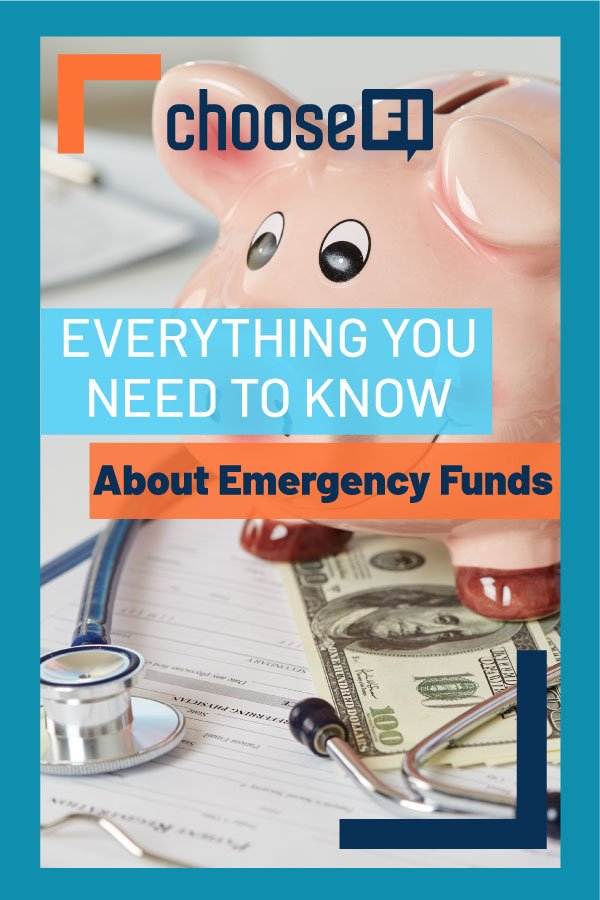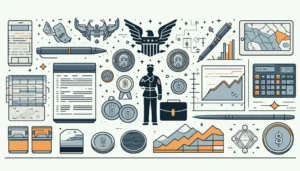It’s happened to all of us at one time or another. You lost your job, a pipe bursts during the winter, ruining your basement, or your old clunker finally dies on your way to work. Emergencies suck. And they often cost a lot of money. That’s why an emergency fund is so important.
Emergency funds are a special type of saving and you use the money only for emergencies. There are many reasons you need an emergency fund (unexpected medical or vet bills anyone?) and there are a number of ways to use side hustles to build or rebuild your emergency fund.
Table Of Contents
- What Is An Emergency Fund?
- Why You Absolutely Need An Emergency Fund
- How To Start Building Your Emergency Fund
- Where Should You Keep Your Emergency Funds?
- When Should You Withdraw From Your Emergency Fund?
- How To Rebuild Your Emergency Fund
What Is An Emergency Fund?
An emergency fund is a place where you save money that you’ll only use for emergencies. We’ll talk in-depth later on in this article about what constitutes an “emergency,” but for now let’s sum it up as a sudden financial expense you didn’t expect.
You’ll want to store this money somewhere it’ll earn some interest and become more valuable (also more on this below). A common rule is to keep three to six months of expenses saved in an emergency fund.
Why You Absolutely Need An Emergency Fund
Emergencies Happen…To Everyone
Whether we like it or not, life happens. And with life comes a few unexpected emergencies. If you’re not prepared, you could end up draining your entire savings that you were planning to use on a vacation or that home improvement project. Or worse… put the emergency expenses on a credit card.
If you have an emergency fund, you’ll use only the money you have set aside for emergencies, rather than the cash you had saved for other projects.
The Alternatives Aren’t Great
If you don’t have an emergency fund and you have no other savings, your alternatives to pay for your emergency aren’t the best.
You’ll have to either put your bills on your credit card, which could lead to some serious credit card debt. Or even worse, you may have to use a payday loan, which have interest rates in the hundreds. Plus, you typically need to repay them by your next payday.
Or, as I said above, you end up dipping into your other savings accounts, or maybe even your retirement account. When you’re trying to reach FI, the last thing you want to do is take a loan from your retirement savings.
How To Start Building Your Emergency Funds
How Much Money Should Be In Your Fund?
The amount of money you’ll need to fund your account depends on how much your monthly expenses are. But a good rule of thumb according to most everyone in the personal finance world is to have three to six months’ worth of savings.
That can seem pretty daunting for someone who’s just starting to build an emergency fund.
Starting From Zero? Do The Following…
Include it in your budget
The easiest way to keep track of how much you’re saving is to include it in your budget. Just like you may save for other goals, set aside a good portion of cash to fund your account. Put it on autopilot to make it even easier.
As an example, say you need $3,000 a month to pay for rent, utilities, food, and other debt obligations (auto loan, student loans, etc.) If you wanted to start on the small end of the emergency fund, you’ll need $9,000 for three months of expenses.
That’s quite a bit of money, but even if you start putting a few hundred dollars a month, that’s a good start. And as you’ll see below, if you put your cash in the right account, you can earn a high rate of return on your money.
Put it somewhere that can earn you more money
There’s not much that’s better than getting free money. When you put your emergency funds to work and save (or invest) it in the right place, you could earn interest just by keeping your money with certain banks or institutions.
Where Should You Keep Your Emergency Funds?
Online Savings Accounts
This is personally where I keep my emergency fund. Opening a savings account is easier than ever, and high-yield, online savings accounts can usually get you the highest interest rate.
To give you a sense of how much you can saving in a high-yield account, I used CNN’s Saving’s Calculator. For this example, you’d deposit an initial $1,000, and each month you’d deposit an extra $100. With a savings rate of 2.0% you’d have $7,405 in five years.
CIT Bank
CIT Bank is ChooseFI’s most recommended savings account because you can get the highest rate they offer, 1.30%, by simply depositing $100 a month into the account, or by keeping an average balance of $25,000. Even if you don’t meet either of these requirements you’ll still earn a respectable 1.10%, which is much higher than you will see at your local brick and mortar bank.
With no monthly fees, and only $100 minimum deposit you can see why we love CIT Bank.
Check out our full review of CIT Bank here.
Investments
Investing your emergency fund can be tricky. You’ll need liquid investments that you can withdraw from in the event of an emergency.
We have a couple of recommendations for where to invest:
M1 Finance
M1 Finance is the perfect place to invest if you want a hybrid between a robo-advisor and a self-managed portfolio.
What that means is you get to pick your investments, but they’re automatically managed by M1’s robo-advisor. This means you should know a little bit about investing before settling on M1 as your robo-advisor.
With M1 you can invest in ETFs and stocks, with a minimum of $100 to start investing. But the good news? M1 is free!
For more information, read our full M1 Finance review.
When Should You Withdraw From Your Emergency Fund?
You should only withdraw from your emergency fund when there’s…you guessed it, an emergency. But what do we mean when we say emergency? The following examples are just a few situations where you may consider withdrawing from your emergency fund.
You’ve Lost Your Job
This is likely one of the most common reasons people use their emergency funds. If you’ve lost your job, you suddenly have no money coming in, but your bill doesn’t just go away.
That’s why it’s important to have at least three months of expenses saved. That gives you a good buffer for finding a new job.
You Have To Pay An Emergency Medical (Or Vet) Bill
If you get sick and your insurance doesn’t cover a large portion of the medical bill, you’ll need to have cash to pay off your bill, or start a payment plan, before it gets sent to collections (180 days from the notification.)
The same goes for when your pets get sick and need vet treatment. Vet bills can add up, so make sure a small line in your budget goes to keeping your furry friend healthy.
Major Car Or Home Repairs
When the water heater goes out or your car is becoming unsafe its an emergency. When you have an emergency fund you can take care of these issues right away, without going into debt or living in suboptimal situations.
You Have To Pay For An Emergency Trip
An emergency trip is one you have to take–maybe you have to go to a funeral, or your college student broke their arm, or, on a happier note, your friends decide to spontaneously get married and you need to get there because you’re the best man/maid of honor. But before dipping into your emergency fund, see if you can use travel rewards from cards like Chase Sapphire Preferred to get the trip nearly free.
Discover the framework for success from dozens of people who have found their own path to financial independence. Learn how to spend less, earn more, and live a fulfilling life of abundance. Download your free sample chapter today!
Choose FI: Your Blueprint to Financial Independence
If you’d like to learn more about travel rewards, check out our free course.
How To Rebuild Your Emergency Fund
So an emergency happened and now you’re back to step one and need to rebuild your emergency fund. What do you do? You can obviously stick with the methods above, but if you’re frustrated and want to build up your emergency fund a little faster this time, we’ve got a few tips for you–be warned, some of them can be drastic.
Sell Something
A good way to earn fast cash is to sell something you’ve been storing in your basement, attic, or garage. You might not get thousands, but if you sell a few small things, that’s at least a couple hundred dollars you can throw into your emergency fund.
You can sell your stuff in a ton of ways now, including:
- Having a yard sale: This is your best bet if you have a lot of stuff you’re willing to sell.
- Craigslist: Yes, Craigslist can be sketchy, but I’ve sold two cars through Craigslist, and if you know what to look out for you shouldn’t have a problem.
- Selling apps/sites: LetGo, Etsy, eBay, Facebook Marketplace…just to name a small few.
- Your family and friends: If you’re looking to get rid of something quick, asking your family and friends if they know anyone who’s looking to buy is a good option.
Related: The Best Selling Apps For Getting Rid Of Your Stuff
Cut Your Budget Drastically For A Few Months
No one wants to do this, but those that do reap the rewards. Cutting back on a few things in your budget is different than cutting out all those fun activities that you spend money on.
Here’s what you’ll need to lose if you’re willing to drastically cut your budget (don’t worry, there’s plenty of savings to be had).
- Cut cable (check out the best cable alternatives here)
- Don’t have a car (this is obviously only for people who don’t need a car to get back and forth to work/don’t have kids they need to cart around)
- Don’t eat out…at all
- Stick to your grocery budget
- Move to a smaller home (here are some tips for downsizing your home)
- Cut your cell phone plan Republic Wireless as a super-cheap phone plan)
Related: Republic Wireless Vs Other Cheap Cell Phone Plans
Become A Host On Airbnb
If you have the room, know that Airbnb hosts can make hundreds or thousands of dollars per month.
Obviously, how much you make exactly will depend on a lot of factors, including where you live, if you have just a room or a whole private home for your guests, the time of year, and more.
Related: House Hacking With Airbnb
Get A Side-Hustle
If you don’t already have a side-hustle, we highly recommend getting one. Not only is it a great way to fund your emergency fund, but having a side-hustle is what gets most folks to FI a lot faster.
A side hustle will not only give you more income right now, which can boost your emergency fund, but it will allow you to invest more for retirement later. And that will speed up your time to FI at a rate you won’t believe.
Related: Why A Side Hustle Is FI’s Secret Weapon
Final Thoughts
Emergency funds are a must-have. No ifs, ands, or buts about it. Emergencies are bound to happen to everyone.
Luckily, starting an emergency fund is as easy as opening a high-yield savings account and depositing a chunk of money each month. The goal is to get three to six month’s worth of expenses saved in your emergency fund.
Related Articles
- 50 Ways To Improve Your Finances By 1%
- Beginner’s Guide To Reaching Financial Independence
- Emergency Fund And Financial Resilience




